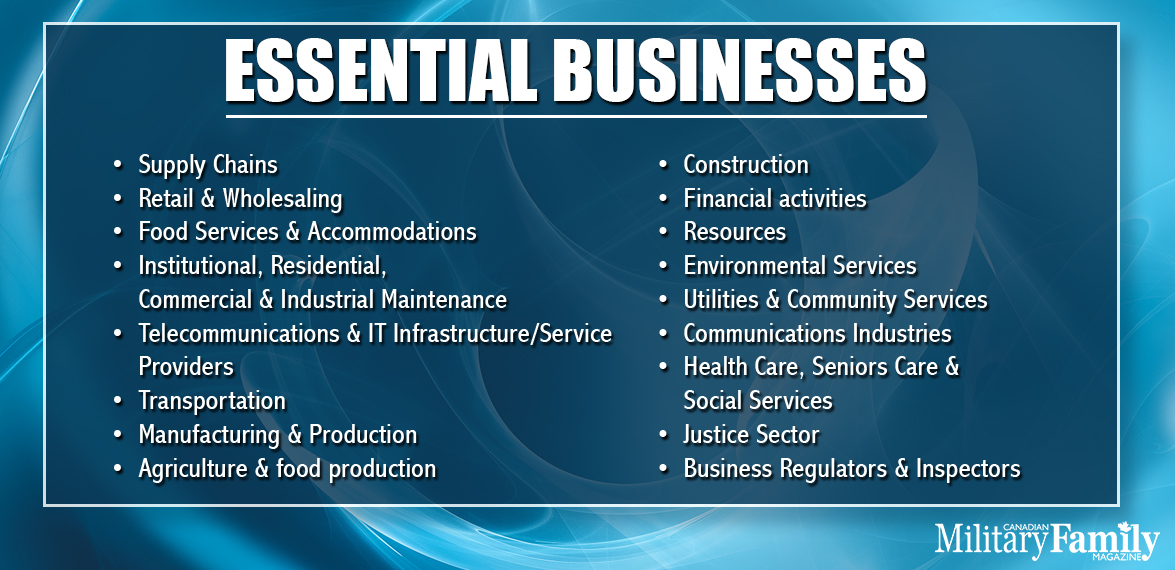Today’s News
Essential businesses and services list released ahead of midnight closures
Yesterday afternoon, Ontario announced that all non-essential businesses still operating within the province must close for two weeks.
The Government of Canada has reassured those residing in Ontario that access to grocery stores and pharmacies, power, and telecommunications would not be affected by this news.
“My first priority is keeping all Ontarians safe. Today I ordered the mandatory closure of all non-essential workplaces effective March 24th at midnight. If you can work from home, you may continue to do so. We will remain vigilant and strong, and we will get through this together,” tweeted Premier of Ontario, Doug Ford.
Alongside the announcement, a list of workplaces deemed essential, and therefore not required to close in light of the COVID-19 pandemic. The list does not prevent provision of work through online, telephone, or by mail delivery.
Teleworking and online commerce businesses have been permitted at all times.
The following services are considered essential for day-to-day living within the province, and will, therefore, remain unaffected:
- Supply Chains
- Retail and Wholesaling
- Food Services and Accommodations
- Institutional, Residential, Commercial & Industrial Maintenance
- Telecommunications and IT Infrastructure/Service Providers
- Transportation
- Manufacturing and Production
- Agriculture and food production
- Construction
- Financial Activities
- Resources
- Environment Services
- Utilities and Community Services
- Communications Industries
- Research
- Health Care and Seniors Care and Social Services
- Justice Sector
- Other Businesses
- Business Regulators and Inspectors
Full details of each sector and the businesses are below:
Supply Chains
- Those business which are supplying other essential services with support, supplies, systems, or services, such as processing, packaging, distribution, delivery, and maintenance, are able to operate.
Retail and Wholesaling
- Any businesses engaged in retail and wholesale of food, pet food and supplies, and essential household consumer products needed to ensure the safety, sanitation, and essential operations of residences are able to remain open. This includes grocery stores, supermarkets, convenience stores, and those that provide essential health and welfare of animals.
- Stores that sell beer, wine, and liquor, as well as those that produce alcohol and cannabis, are able to remain open.
- Gas stations, diesel, propane providers, and fuel providers for motor vehicles, aircrafts and marine crafts.
- Motor vehicle and auto-supply shops, repair, car, and truck dealerships are able to operate.
- Hardware stores and stores that provide hardware products necessary to the essential operations are able to remain open.
- Business providing pharmaceuticals and pharmaceutical services, such as pharmacies and dispensaries, are able to operate.
- Any businesses supplying office products and services for individuals working from home and for essential businesses can continue to operate.
Food Services and Accommodations
- Restaurants and other facilities that prepare and serve food, are allowed to operate only delivery or takeaway services.
- Hotels, motels, shared rental units, and similar facilities, including student residences, are able to operate.
Institutional, Residential, Commercial and Industrial Maintenance
- Those that provide support and maintenance services, such as urgent repair to maintain the safety, security, sanitation, and essential operation of buildings. These include property management services, plumbers, electricians, janitorial workers, cleaning services, security services, fire safety, and sprinkler systems, building systems maintenance, and repair technicians and engineers.
Telecommunications and IT Infrastructure/Service Providers
- Businesses engaged in providing online services, software products, and related services, as well as the technical facilities such as data centres and other network facilities necessary for their operation and delivery.
- Any businesses providing telecommunications services, as well as support facilities such as call centres.
Transportation
- Taxis and other private transportation providers.
- Any facilities providing transportation services to businesses and individuals by air, water, road, and rail. This includes providing logistical support, distribution services, warehousing, and storage, including truck stops and tow operators.
- Businesses that provide materials and services for the operation, maintenance and safety of transportation systems.
Manufacturing and Production
- Businesses that extract, manufacture, process, and distribute goods, products, equipment, and materials.
Agriculture and food production
- Businesses that farm, harvest, process, manufacture, produce or distribute food, including beverages, crops, animal products and by-products, aquaculture, hunting, and fishing.
- Business that support the safety of food, including animal and plant health and animal welfare.
- Businesses that provide veterinary services, and that supply veterinary and animal control medications and related supplies and testing kits.
- Businesses that help to ensure safe and effective waste management.
Construction
- Construction projects and services associated with the healthcare sector, including new facilities, expansions, renovations, and conversion of spaces that could be repurposed for health care space, are able to continue operations.
- Construction projects and services required to ensure safe and reliable operations of critical provincial infrastructure.
- Demolition services, in the industrial, commercial, institutional, and residential sectors.
- Construction work and services that supports health and safety environmental rehabilitation projects.
Financial Activities
- Capital markets, banking, and activities related to Credit Intermediation, credit unions, insurance, and businesses that provide pension services and employee benefits services can continue operations.
- Businesses providing financial services, including payment processing and the payroll division of any employer, can continue operations.
Resources
- Businesses that ensure global continuity of supply of mining materials and products can continue to operate.
- Businesses that ensure global continuity of supply of forestry products can continue to operate.
- Businesses that ensure global continuity of supply of aggregates to support critical infrastructure repairs and emergency response requirements.
- Businesses that ensure global continuity of supply of petroleum and petroleum by-products.
Environmental Services
- Businesses that support environmental management/monitoring and spill clean-up and response can continue to operate.
- This includes environmental consulting firms, professional engineers and geoscientists, septics haulers, well drillers, pesticides applicators and exterminators, management of industrial sewage/effluent, and environmental laboratories.
Utilities and Community Services
- Utilities, and businesses that support the provision of utilities and community services, including by providing products, materials, and services needed for the delivery of utilities and community services:
- Waste Collection, Waste/ Sewage Treatment and Disposal, operation of landfills, and Hazardous Waste Disposal;
- Potable drinking water;
- Electricity Generation, transmission, distribution, and storage;
- Natural Gas distribution, transmission, and storage,
- Road construction and maintenance;
- Police, fire, emergency services including coroner services and pathology services ;
- Corrections and courts services; other government services including licenses and permits;
- Businesses engaged in or supporting the operation, maintenance, and repair of critical infrastructure.
Communications Industries
- Newspaper publishers
- Radio & Television Broadcasting
- Telecommunications providers
- Research
- Businesses and organizations that maintain research facilities and engage in research, including medical research and other research and development activities.
- Businesses that provide products and services that support research activities.
Health Care and Seniors Care and Social Services
- Organizations and providers that deliver home care services
- Retirement homes
- Long-term Care Facilities
- Independent health facilities
- Laboratories and specimen collection centres
- Manufacturers, wholesalers, distributors, and retailers of pharmaceutical products and medical supplies, including medications, medical isotopes, vaccines and antivirals; medical devices, and medical supplies.
- Manufacturers, logistics, and distributors of products and/or services that support the delivery of health care in all locations (including but not limited to hospitals, labs, long-term care homes, other residential health care, physicians, nurse practitioners, and midwives, and home care services).
- Businesses that provide products and/or services that support the health sector or that provide health services, including mental health and addictions and counselling supports.
- Businesses that sell, rent, or repair assistive/mobility/medical devices, aids and/or supplies.
- Businesses that provide personal support services (many seniors and persons with disabilities, who can afford to, hire individuals to assist with the activities of daily living).
- Health care professionals providing emergency care, including dentists optometrists and physio-therapists.
- Not-for-profit organizations that provide critical personal support services in home and also provide residential services for individuals with physical disabilities (such as the Centre for Independent Living and March of Dimes).
- Businesses and all other organizations that support the provision of food, shelter, safety or protection, and/or social services and other necessities of life to economically disadvantaged and other vulnerable individuals, including but not limited to food banks, violence against women emergency shelters, homeless shelters, community housing, supportive housing, children’s aid societies, residential services for adults with developmental disabilities and for children, and custody and detention programs for young persons in conflict with the law.
Justice Sector
- Professional and social services that support the legal and justice system can continue to operate.
Other Businesses
- Rental and leasing services, including automobile, commercial and light industrial machinery and equipment rental
- Businesses providing mailing, shipping, courier and delivery services, including post office boxes
- Laundromats, dry cleaners, and laundry service providers
- Professional services including lawyers and para-legals, engineers, accountants, translators
- Businesses providing funeral, mortician, cremation, transfer, and burial services, and any related goods and products (such as coffins and embalming fluid)
- Land registration services, and real estate agent services and moving services
- Businesses providing security services including private security guards; monitoring or surveillance equipment and services
- Businesses providing staffing services, including temporary help
- Businesses that support the safe operations of residences and essential businesses
- Businesses that provide for the health and welfare of animals, including veterinarians, farms, boarding kennels, stables, animal shelters, zoos, aquariums, research facilities, and other service providers
- Child care services for essential workers, and home child care services of less than six children
- Businesses providing cheque cashing services
- Business Regulators and Inspectors
- Organizations, including administrative authorities, that regulate and inspect businesses









